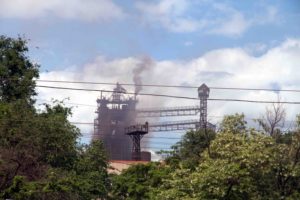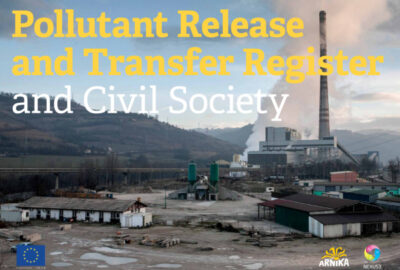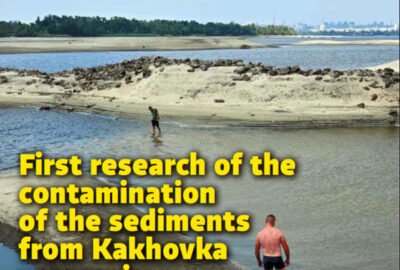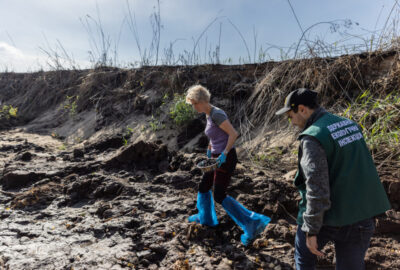To get to the city of Mariupol in the south of Donetsk Oblast in summer 2017 one had to go through several checkpoints controlled by soldiers with machine guns. The strategic port on the north coast of the Sea of Azov is one of the crucial areas of Ukraine at the moment. During the war in Donbas, Mariupol was attacked several times: in 2014, the city was controlled by pro-Russian forces for 3 months; in January 2015, 30 people were killed during a rocket attack before the city was defended by the Ukrainian forces with the help of local volunteers. Occasionally, one can still hear shooting as the battle line is only 30 km from the city.
Monocity
Full 10 % of all Ukrainian industrial production comes from Mariupol. During the 20th century, the iron and steel industries predominated in Mariupol. There are more than 50 large enterprises, and this leaves the city of 462,000 inhabitants extremely vulnerable to air pollution, and, economically, dependent on a single oligarch, Rinat Akhmetov, who owns almost all of Mariupol’s industry. Akhmetov is the wealthiest man in Ukraine. He is the major shareholder of the Metinvest Group – a vertically integrated Ukrainian group of steel and mining companies – and the owner of two large metallurgical plants based in Mariupol: the Azovstal iron and steel works and the Ilyich iron and steel works. Established during the Soviet era, in the early 1930s, both plants are extremely technologically obsolete with outdated equipment lacking environmental safety controls.
Let us breathe!
Up to 98 % of all Mariupol emissions are produced by Metinvest steelworks. According to the journal The Ukrainian Week, the annual share of industrial air pollution in Mariupol in 2012 was 800 kg per citizen. In that year, the environmental situation became so critical that according to the local people, on some days it wasn’t possible to walk the streets without a respirator. Furthermore, in Mariupol, citizens weren’t officially warned about bad weather conditions by authorities and there was no official independent measurement of the air pollution.
In January, a small informal group of activists called “Дайте кислорода!/ Let us breathe!” led by the activist Maksim Borodin, who later became a local councillor, organized their first protest in which 800 Mariupol people took part, demanding intervention by responsible authorities. Within a year, this platform became much bigger and in November 2012 it held another protest which was one of the biggest environmental protests ever organized in Ukraine. 10,000 people came in respirators to City Hall, and 13,000 people signed the anti-smog resolution presented to the Ukrainian government and president.
After negotiations with Metinvest, the company decided to invest 620 million dollars into modernization, moved production from the obsolete Azovstal metal works to the neighbouring Ilyich metal works and suspended the sinter plant of Azovstal. Three obsolete coke ovens have been closed and several Azovstal filters have been repaired. Metinvest and the city council promised the people that they would try to reduce emissions by 40% by 2020.
Fighting pollution through the public resistance
“Before we began to exert pressure on Metinvest to make the company adhere to environmental standards we were used to breathing orange smoke. Today the air is noticeably better. Modernization is not yet complete, but the owner now knows that he is constantly the subject of public oversight,” says Maksim Borodin. There is still a great need for independent pollution monitoring in the city. Moreover, Borodin stresses how important it will be to change Ukrainian legislation and adapt it to European law, in order for it to be more financially advantageous for the big polluters to modernize than to break the environmental law and shirk their duties.
Air improvement could help to stop the massive migration from the city, where the predominant industry gradually elbowed out small businesses and where people constantly suffer not only from the ongoing military conflict but also as a result of the extremely dangerous environmental conditions.







